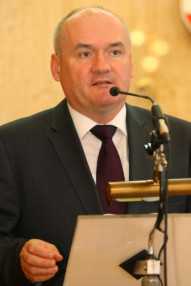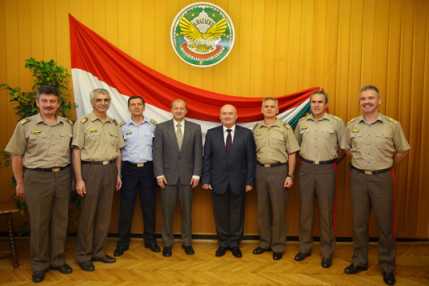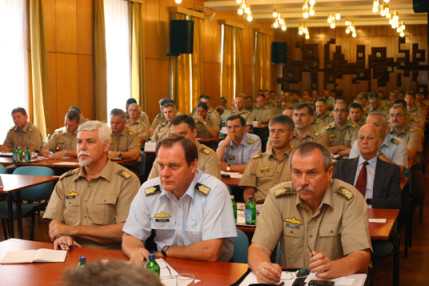Defence minister’s meeting with military attachés
Szöveg: Andrea Kánya | 2010. július 4. 17:34The 2010 conference of Hungarian defence, military and air attachés accredited to foreign countries was held on Tuesday in the Military Intelligence Office of the Republic of Hungary. In his presentation Minister of Defence Dr. Csaba Hende mentioned bilateral international relations and Hungary’s participation in missions, among others.
Maj.Gen. (eng.) András Tóth, the Director General of the Military Intelligence Office (MIO), also speaking on behalf of Péter Siklósi, the Deputy State Secretary for Defence Policy and Planning, Ministry of Defence, greeted the attendees, among them Dr. István Simicskó, the State Secretary of the MoD, Lt.Gen. Tibor Benkõ, Chief of Defence Staff, and Brig.Gen. László Domján, the Director General of the Military Security Office.
András Tóth said the circumstances of this year’s conference are considered extraordinary because only a month has passed since the new government entered office and the change of directors at the Military Intelligence Office also took place only a few weeks ago. He said these two events mean new requirements, a new style, and for the attachés, new challenges in their profession.
The director general said the primary aim of the meeting is to evaluate the previous year’s activities in military diplomacy, the work completed, the results and possible mistakes. “Traditionally, this forum provides an opportunity for the minister to outline his requirements regarding military diplomatic activities," emphasised the director general, adding that another important aim of the event is to supply attachés with new information, enlarge their knowledge and improve preparedness. “We have asked leaders in responsible positions in the Ministry of Defence, the Ministry of Foreign Affairs, and the Hungarian Defence Forces to inform us, in the framework of a presentation, about issues concening military diplomacy which are beyond the individual competences of our attaché colleagues," said András Tóth.

The minister said: at the moment the defence forces’ level of deployability infringes the Constitution and the Washington Treaty alike. "It also weakens the capability of Hungarian foreign and national policy to assert our interests. In recent years, our weight in NATO has gradually decreased. Our successful participation in missions which is the result of our troops’ committed work, often beyond their power could not compensate for it. We want to and we will put an end to these processes, and I am asking you to work for this," said Csaba Hende.
The minister pointed out: the Hungarian Defence Forces participate in the alliance cooperation, international integration, and missions in order to protect national interests. "The efficient operation of our system of representation in military diplomacy is fundamental to succeeding in our national objectives. You, the defence, military and air attachés of the country, who represent the defence minister and the Hungarian Defence Forces in the host country, have an important role. You are the eyes, ears and mouth of the defence leadership: it is you who see, hear, and talk on behalf of it. Your face, personality represents Hungarian home defence abroad," he said. The minister added: attachés’ suggestions, reports are essential because due to their local knowledge and experience they are more sensitive to events, changes happening in the given country. "This is why they can make prognoses about and follow the impacts of upcoming or already made official decisions on our country, the Hungarian Defence Forces, and the security of our soldiers stationed in the given region. The defence leadership needs rapid and high quality prognoses in order to make the right decisions at the right time," Csaba Hende underlined. "In our militarised world the screening of information for valid and reliable elements, their evaluation and utilisation is a serious task – in this flow of information I wish to rely on your work to a greater extent in topics related to your area of specialisation," the minister added. Csaba Hende underlined: it is important that attachés also receive continuous and detailed update from the MoD on the Hungarian standpoint, initiatives to be represented in various global, alliance and regional issues concerning security, defence and military policies.
In his address the minister mentioned the question of building and maintaining bilateral relations in the framework of international military cooperation. He said the MoD makes efforts to achieve that the bilateral relations help the HDF’s integration into the institutional structure of the alliance, support the building of a capability-based, modern army which is able to carry out tasks in missions, and allow the Hungarian military to demonstrate its preparedness and its activities conducted internationally, and to earn recognition as a reliable ally and partner.

Csaba Hende said: in the bilateral international cooperations of the Hungarian Defence Forces, besides the member states of NATO and the EU, it is mainly Russia, Serbia, the Ukraine, Montenegro and Bosnia-Herzegovina, China, India and Pakistan who have priority. The minister added: in order to achieve success in national causes, the new government will renew the alliance with the West. "It will build stronger relations with America and at the same time it will establish a new basis for its relations with eastern states. We have to make our country a determining participant in Central European cooperation as well," stressed Csaba Hende. He said bilateral military relations must contribute to the improvement of military stability and security in the region.
The minister said emphasis has to be laid on bilateral relations to improve conditions in missions. He cited NATO’s SAC program, the Military Medicine Centre of Excellence, the V4 cooperation, and the activity of the Italian–Hungarian–Slovenian land force and the Tisza Battalion, as examples for the efficiency of bilateral relations.
The minister underlined: the preparation for the duties of the rotating EU presidency, due in the first half of 2011, are highly important. Csaba Hende said one of the pillars of the security of the Republic of Hungary is our NATO membership based on the country’s commitment to Euro-Atlantic values, therefore in meetings and during consultations with the representatives of NATO’s allies it is important to introduce the tasks to be carried out by the MoD and our efforts made in order to fulfil our obligations and commitments in NATO
The minister pointed out in his speech that Hungary is to increase its contribution to ISAF in Afghanistan. "The capability development and training of the Afghan army will remain in the focus of our efforts: we wish to continue our participation in the OMLT and we will continue to send instructors to various military schools. Thus our new commitments are directed at increasing participation in the training of the Afghan National Army, furthermore as of October 1, 2010, assuming the role of lead nation in the Kabul Internaitonal Airfield with 83 troops, improving the logistic supply of Hungarian elements stationed abroad, and increasing the number of soldiers serving at various ISAF commands in individual positions," he said. Csaba Hende also mentioned that owing to recent developments, the activity of insurgents in the northern region, the gradual decline of security, the reinforcement of the Hungarian unit and the US military and civilian presence that also concerns Baghlan province, and the review of the PRT’s role, it is necessary to thoroughly examine questions concerning Hungary’s commitment – and especially the future role of the PRT – in Afghanistan. The minister announced that the Ministry of Defence and the Ministry of Foreign Affairs have set up a joint workgroup for that.
Regarding issues related to the Kosovo mission Csaba Hende said that the stability of Kosovo is of key importance in the region. “On the whole, the country can be considered stable now, but KFOR has to be ready to act in the event of tension. It is not only the stability of Kosovo at stake but the security of the entire region. We cannot ignore the economic, social and political problems either, which are threatening the stability of Kosovo. Despite the present financial difficulties our country wishes to maintain its very considerable contribution to KFOR until the mission ends," the minister pointed out. He stressed that politically, Hungary’s participation in KFOR is a sensitive topic as regards Hungarian–Serbian relations. "We must make a very prudent decision before Hungary takes on a task in North Kosovo as well. The operation in Bosnia–Herzegovina is of primary importance to us, we wish to maintain our participation with the current team of 155 until the mandate of the operation expires, that is November 2010," said he minister, who added: following that we should switch to a training and monitoring mission with no executive mandate. He said their plans are that we would participate in the latter with some 15 troops. "In addition to that – and provided there is a positive decision – we wish to participate in the destruction of ammunition with 30-40 troops and would like to help the Bosnian military in resolving problems arising in this field," said Csaba Hende. The minister added: naturally, they wish to complete all the above in cooperation with other international organisations.

“Even though the African continent is playing an ever greater role in the EU’s crisis management activities, we have not planned to realise a greater contribution. We have highly limited resources as regards the capabilities necessary to a commitment in Africa, therefore our commitment in the continent is limited to staff officers in the first place, and we are also considering participation in the EU’s mentoring mission," the minister emphasised, adding that at the moment there is one soldier serving at EU NAVFOR Operation Atalanta and two soldiers serving in the Congo. “Our objective is to maintain and if possible, increase our participation as experts, advisors in smaller missions similar to the one in the Congo, supporting the reform of the security/defence sector in the first place," he added. The minister also called attention to the military mission supporting the training of Somalian security forces, in which three Hungarian trainers participate.
At the end of his address Csaba Hende summarised the objectives and tasks of the defence forces and said that giving regular update to the host country about the activity of the MoD and the HDF is of key importance, with special regard to security and defence policy initiatives related to the upcoming EU presidency of our country, our achievements and international military commitments.
The minister asked the attachés to pay attention to the opinion of the international community of the MoD and the reactions given to their suggestions aimed at strengthening regional and global security. Csaba Hende added: by activating military diplomacy they have to promote a more efficient assertion of interests and the improvement of the quality of international contacts.
He also asked attachés to faciliate the introduction of the products of Hungarian defence industry in the international market, and his expectation of military attachés accredited to the EU was that they should play special attention to gathering information related to the EU. The minister asked the attending diplomats to be rational in their profession, introduce strict cost saving measures, and use the available resources in an efficient way in the course of implementation.